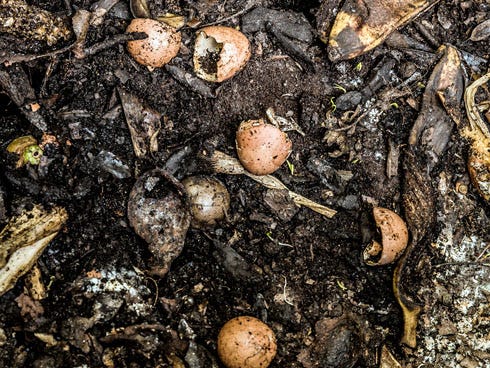
Winter is an ideal time to convert garden, yard and kitchen debris into soil-enriching compost.
We can use much of our trash to make gardens more productive, which means more fresh produce to enjoy.
WHAT TO CONVERT
Many materials can be used to produce compost — that is, organic matter, or material that once lived.
Grass clippings, leaves, egg shells, coffee grounds, tea bags, vegetable and fruit clippings, shredded paper and chopped brush are some examples of organic matter suitable for composting. (Also, chopped or shredded materials compost faster.)
Avoid cheese, meat scraps, fats or bones because of the potential of attracting pests like rodents. These materials are slower to decompose and may create odor problems.
BUILDING THE BIN
A compost bin's size may vary but you need to construct an enclosure at least 3 feet by 3 feet by 3 feet. It can be made from almost anything: wire, wooden pallets or cement blocks.
One side of the bin should be open or removable for ease of adding and removing materials.
The simplest compost bin that I use is a wire hoop made from welded fence wire. The piece of fence wire should be long enough to make a 3-foot diameter hoop. This hoop bin is sturdy enough to stand on its own.
THE N FACTOR
The beneficial bacteria and fungi use nitrogen to break down organic materials.
To provide nitrogen, add ½ cup ammonium nitrate per bushel of organic material added to the compost pile.
One suggestion is to alternate 8 to 12 inches of organic matter, 2 inches of topsoil and 1 cup of any complete fertilizer (per layer) until the container is full. Then add enough water to get the material to the consistency of a wet sponge.
GETTING AIR
Microorganisms also must have air to live. Frequently turning a shovel or pitchfork will benefit the bacteria and fungi, resulting in organic materials' faster decomposition.
Using the wire hoop makes turning the pile easy. Simply pick up the wire hoop and set it to the side of your pile of compost.
Next, use a pitchfork or shovel to place compost materials back into the wire hoop in its new location.
Larry Williams is an agent at the University of Florida's Institute of Food and Agricultural Sciences Extension office in Crestview.
This article originally appeared on Crestview News Bulletin: WILLIAMS: Northwest Florida gardeners can convert trash into garden treasure
